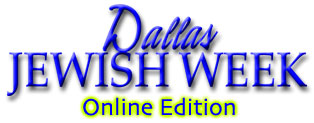| Dallas Jewish Week Menu
|
 |
It's up to individual Jews to market Israel, says speaker
by Tamara Stokes
Staff Writer
A powerful presentation can make a difference in the world, and Neil Lazarus' goal is "to market Israel just as any product is marketed, complete with a professional image."
A motivational speaker who earns his livelihood by giving presentations and teaching people how to make them, Lazarus is an advocate for Israel, responsible for training spokespersons on behalf of the Jewish state for such clients as the Israel Ministry of Foreign Affairs, The Israel Ministry of Tourism, Jewish Agency for Israel and Hadassah.
He was in Dallas last week for an April 2 talk sponsored by B'nai Zion and Shaare Tefilla; some 100 people attended the event at the shul.
"It's important now for both Jewish and non-Jewish communities in America to show support for Israel. There are so many commonalities," Lazarus says during an interview prior to his speaking engagement.
One of the best ways to support Israel is by being prepared and proactively talking about one's views, says the British-born Lazarus, who has political science degrees and moved to Israel in 1998.
The author of an e-publication, "Strike Back," which encourages every Jew to be an ambassador for Israel, and tells how to fight bias in the media and how to deal with anti-Semitism, cites five major rules during his presentations.
"First," he says, "you have to have a message. It can be simple, but the image must be conveyed."
Second, Lazarus says the message must be an emotional one. "As people of the book, we have a tendency to explain rather than feel. What you consider is the impact of the media on today's generation," which he called the "flick-click" generation. Lazarus says young people don't need long explanations, but gut reactions.
Third, the message should be personalized. He says through many media, people see slogans all the time. In relation to Israel, and the war on terror, it is important to convey real families and people are being hurt and killed. Rather than quoting statistics, like 700 people have died in suicide bomb attacks, he takes the message to a personal level of loss he can express.
For example, three friends of his have died as a result of suicide bombings during the past year. Lazarus says that bringing a personal message and experience to the table allows you to share your passion and your audience can empathize with your feelings.
Fourth, speak the audience's language, and he's not talking about English, Hebrew or French. When he's in New York, he refers to the size of the West Bank in terms of city blocks. Asked about how he will refer to it in Dallas, he says, "What's about 9 miles from Dallas?"
Told suburbs like Garland and Mesquite, Lazarus says he believes the audience here will identify with the size. It is important, he says, to gain common ground with the audience.
Finally, Lazarus says that to get to a "yes" to your position, you must create an agenda for getting a pro-Israel agenda.
Lazarus says that for the rules to be optimally effective, one must "Walk the way you talk" and support Israel by visiting the country.
"People don't understand how terrible the economy is. Tourism is at the lowest point ever since 1973, prior to the Yom Kippur War. Great damage has been done to the economy," says Lazarus.
Poverty is a real social issue. Lazarus recommends personally raising funds and presenting it to a specific agency in Israel if there is any concern regarding the distribution of money raised here in the United States on Israel's behalf.
Rather than wait to react to an anti-Israel statement, Lazarus says it is important to be proactive with one's own message of support.
Lazarus' parting advice to the Jewish community and other Israeli advocates is, "Don't wait for a negative comment about Israel. The reality is, especially when things [politically] appear to be quiet, it is important to speak out."
This story was published in the DallasJewishWeek
on: Thursday, April 10, 2003
Copyright 2003, Dallas Jewish Week